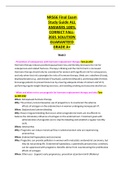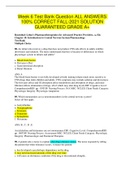Pharm nr566 - Study guides, Class notes & Summaries
Looking for the best study guides, study notes and summaries about Pharm nr566? On this page you'll find 33 study documents about Pharm nr566.
Page 4 out of 33 results
Sort by

-
Management of Psychiatric Conditions in Primary Care: Panic Disorder Rosetta Vaughn RN BSN MSN NR 566- Advanced Pharmacology For Care of the Family ALL ANSWERS 100% CORRECT FALL-2021 AID GRADE A
- Other • 15 pages • 2021
-
- $14.99
- + learn more
anic Disorder is characterized by recurrent, intensely uncomfortably episodes known as panic attacks. A panic attack is an abrupt surge of intense fear or intense discomfort during which four or more of the following are present: • Palpitations, pounding heart, racing heartbeat • Sweating • Trembling or shacking • Chest pain or discomfort Katie Smith, a 27-year-old female, enters the primary care setting experiencing an episode of extreme chest pain, difficulty breathing, and numbne...

-
NR566 Final Exam Study Guide ALL ANSWERS 100% CORRECT FALL- 2021 SOLUTION GUARANTEED GRADE A+
- Exam (elaborations) • 32 pages • 2021
-
- $14.99
- + learn more
Prevention of osteoporosis with hormone replacement therapy Tara (p.433) Hormone therapy reduces postmenopausal bone loss and thereby decreases the risk for osteoporosis and related fractures. Therapy is lifelong and the risk for harm is increased. Hormone therapy should only be considered for women with significant risk for osteoporosis, and only when that risk outweighs the risks of hormone therapy. Meds are: raloxifene (Evista), bisphosphonates (e.g., alendronate {Fosamax}), calcitonin (...

-
Week 6 Test Bank Question ALL ANSWERS 100% CORRECT FALL-2021 SOLUTION GUARANTEED GRADE A+
- Other • 20 pages • 2021
-
- $13.99
- + learn more
88. An infant who receives a drug that does not produce CNS side effects in adults exhibits drowsiness and sedation. The nurse understands that this is because of differences in which physiologic system in infants and adults? a. Blood-brain barrier b. First-pass effect c. Gastrointestinal absorption d. Renal filtration ANS: A The blood-brain barrier is not fully developed at birth, making infants much more sensitive to CNS drugs than older children and adults. CNS symptoms may include ...

How did he do that? By selling his study resources on Stuvia. Try it yourself! Discover all about earning on Stuvia


